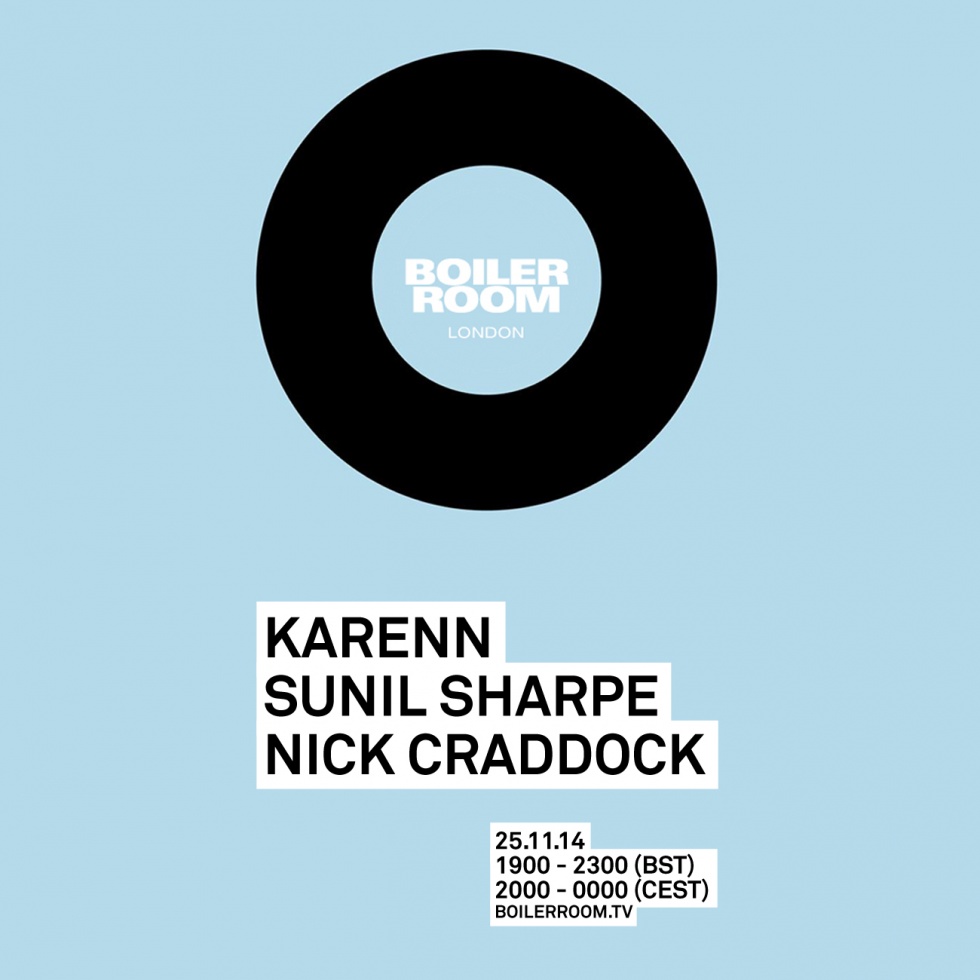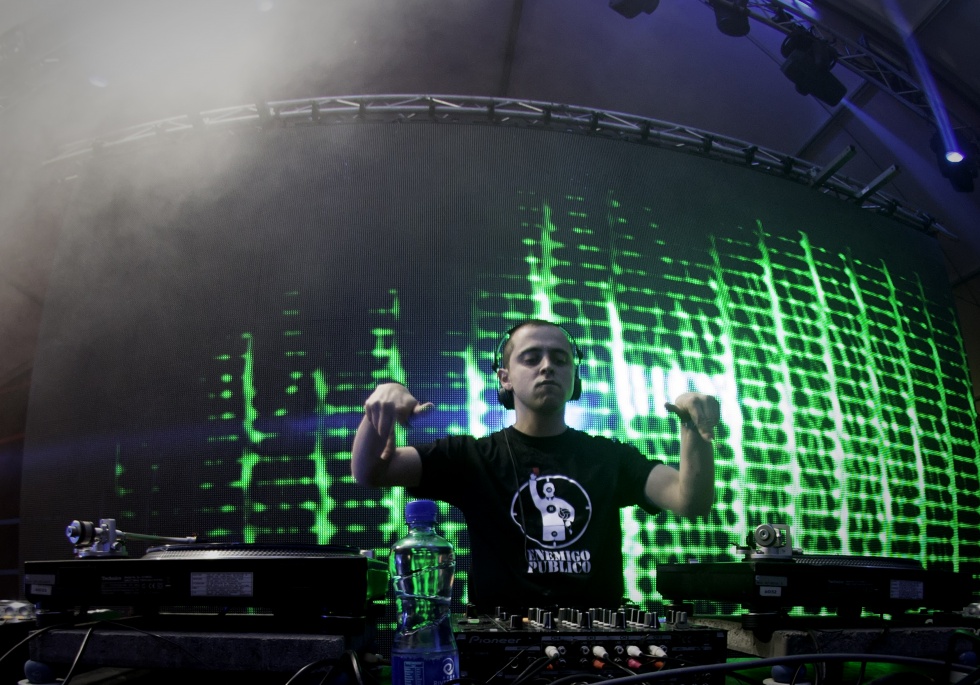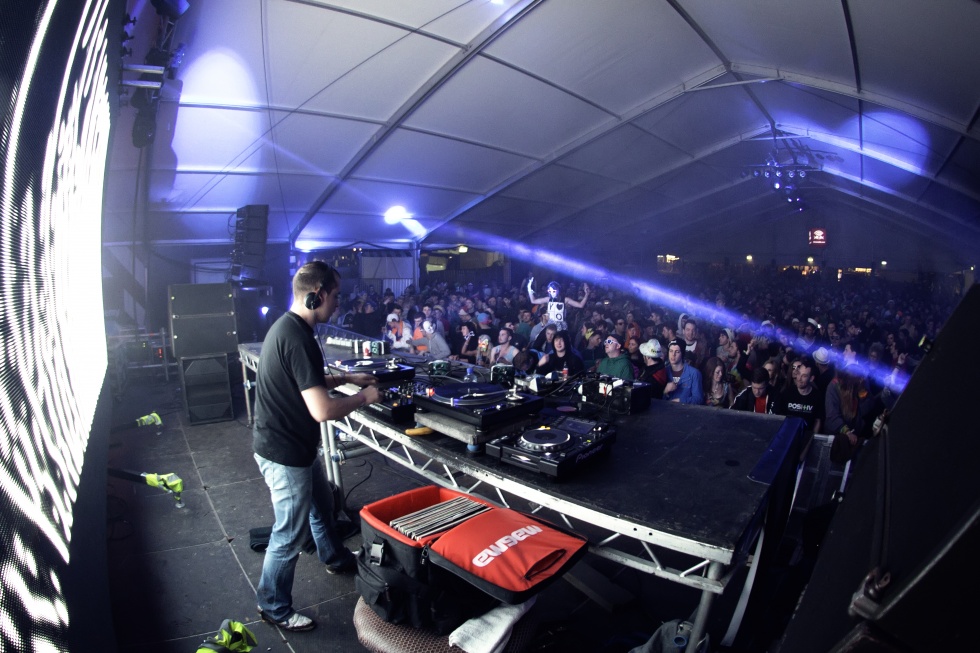For all the talk of resurgences and revivals of rugged underground techno, it’s important to remember that there are people who’ve been keeping the sound alive and current all the way through the lean days of dubstep’s dominance, minimal overload and vinyl’s decline.
Sunil Sharpe is a perfect example; starting with down-and-dirty gigs in Dublin circa 2000, he’s steadily reached out into the global market with no thought of fashionability. He’s not only made a name for himself as a DJ and (since 2006) a producer, but as a supporter and documenter of this scene, particularly via his shows on Ireland’s RTE Radio – which started in 2007 but have latterly expanded to include lengthy interview segments.
This depth and breadth of involvement means there are few people out there who are better placed to contextualise the current movements in techno. Sunil’s involvement with Blawan and Pariah‘s Works The Long Nights label (like that of Surgeon, who teamed up with Blawan as Trade for the label) helps anchor their work in the deeper currents of international techno – and as you’ll see from this Q&A, he provides a valuable sense of perspective about music that’s been there all along suddenly becoming modish.
JOE MUGGS: How do you stand regarding tags like “dark” and “industrial” for techno? It’s one area where artists get very uneasy about categorisation, right?
SUNIL SHARPE: I feel a bit indifferent about these descriptions now, they used to mean something but the dark/industrial tag in techno is very watered down at this point. Taking ‘dark’ as a term on its own, how dark is anything when you’ve heard music like that countless times already?
To me music is truly dark when it scares or shocks you or just genuinely gets under your skin and messes with your senses. Depending on how exposed you have been to techno, you could get these feelings listening to quite a few releases out today, but to see so much music labelled as dark because it has got a slightly gloomy drone lurking in the background is a bit ridiculous.
Same with “industrial” – a heavy kickdrum doesn’t just make it industrial. I think some artists don’t want to be exclusively associated with one style, especially those who look on techno as a bigger picture despite the fact that their recorded material is more focussed on one style of it. Industrial/dark music and so on are perhaps unexpectedly popular at the moment, but nestled a bit more in the undergrowth is probably where those artists feel most comfortable.
Anyway, fuck all of that. Everyone should make bright techno! Seriously, think of that in your head right now and see what you come up with.
What would you say are your musical roots? What led you to the kind of sound you make/play now?
I enjoyed pop music and classical music a lot when younger but near the end of primary school I found rave music, started collecting tapes and got to know what DJs I liked. Almost straight off I gravitated to techno, mostly on the more hardcore side, alongside jungle and, a bit later on, trance. I wasn’t old enough to go to proper clubs, but I was imagining what it could be like from what I’d see on TV or what older people would tell me.
My mates who were into indie seemed to be just into it because their older brothers told them to. Rap and hip-hop just seemed like an act unless you were from the States; dudes you know going on like they were from the Bronx when they were from Templeogue, and I didn’t relate to it at all. Being a rocker wasn’t really something I wanted either. Feeling the rave spirit and getting into techno, it was a very natural path for me to join and stay on.
While I’ve learnt a lot about the music since then, I love and play stuff now that I felt exactly the same about as a teenager. In fact tracking down records now that I heard on old mixtapes is still one of the most rewarding parts of DJing for me. In terms of my own music, I have sometimes seen it described as nineties sounding or old-skool – and I suppose that yes, that era has stayed with me always and it’s hard to shake off your first love – but generally I just make music when I feel like it, normally without any type of plan.
20-plus years ago, techno felt futuristic because there’d never been music like that before. Now it has a huge heritage, can it still operate on the cutting edge and if so how?
Rewind back to old interviews with techno acts and the one word that was used a lot which you don’t hear now is “experimental”. Experimental techno was a sort of “thing” or sub-genre, and there were some producers who would maintain that unless it was truly experimental, it wasn’t techno. There were also others that said if techno didn’t have the funk, it wasn’t techno. Funk, experimentation etc – these are obviously still achieved within techno, and should be expected, but making techno that is truly different or cutting edge isn’t always as easy.
The problem is that techno is so heavily defined already through 25+ years of existence. Too many rules have already been set, and once it goes outside that framework or becomes too different it isn’t classed as techno anymore. I guess techno being on the cutting edge is in the hands of the creators and also labels for being open-minded enough to release challenging music. And obviously the gear/software manufacturers too, who have probably been the biggest innovators over the last ten years.
The album format is starting to come back again in techno which is a really good sign, and this year has had some strong offerings. Hectic gigging schedules seem to be a big problem for many who could move things on further; as soon as a promising producer starts to breakthrough, all of a sudden they’re in a battle to salvage studio time. I think that’s why often the best stuff is made by those who aren’t famous yet, who have more time on their hands, and who have something to prove.
Your music suggests small sweaty basements with just smoke and strobe to me. Do you have a favourite type of gig setting? Does the music lose something in bigger shows — say, at festivals?
Ha, I actually bought a strobe for my bedroom before I was ever in a proper club, so yes, always had an attachment to that kind of vibe! I got one again recently and messed around with it at home but felt like I would have damaged my eyesight very quickly if I kept putting it on so have put it away for now.
My favourite gig setting is to be close to people so obviously I love smaller, compact spaces where both you and the crowd feel the music in a very similar way. Is not to say I don’t enjoy playing to quite big crowds also, I really do, but just not to be perched up too far away or in a place where I can’t feel the interaction as well. If the technical set-up is good and I’m having a comfortable gig to play, I really really get into DJing. I’m enjoying it more now than ever before.
Do you feel your style and that of your close contemporaries influencing other music sounds/scenes, or is it fairly sealed off?
I’m not sure. There was a time during the height of dubstep that both it and techno influenced each other, and I think that was a quite pivotal point for techno re-establishing itself as a genre of substance again. I think people in other scenes, like rock/metal, appreciate some of the production techniques in techno and similarly there is a fair deal of crossover with techno/industrial/drone/noise from fans that come from a more guitar type background and those who are coming from a four-to-the-floor club techno one. I’m not sure how great the influence actually is or would be on other styles, but certainly there is a lot more appreciation for the more abrasive side of techno now from people who previously may have scoffed at it.
A lot of techno labels including Works The Long Nights run a very minimalist/anonymised approach to releases & presentation; do you think this is for a particular reason or just that it’s traditional or even nostalgic for the days of white labels?
I think the internet gives you every type of information on a release that you would ever need unless an artist or label has gone out of their way to conceal it. This gives room to labels to be more minimalist if they need to. All the info will come up on the web anyway and meanwhile the physical aesthetic of the record itself can be more singular and strong.
Yes, the less-is-more approach is traditional in techno and maybe the return of proper techno gave a roundhouse kick to the general information overload that was starting to accompany a lot of records. Selling records became a desperate business for a while though, there were a lot of catalogue number 001s and no 002s during the time where vinyl sales had dropped. The fact that you can just hoof out a record now with little info on it and expect people to do their homework and come back for the next one, is really something I think.
On that same topic, you talk and explain stuff on your radio show, and do interviews with artists who rarely speak publicly elsewhere; was there a particular reason to format it like that rather than just having a mix show?
RTE had asked me to extend my monthly slot to two hours, and I didn’t want to unless it became more of a show rather than a two hour long mix. I have a bit of a journalistic/trainspotting background and I like to keep that alive sometimes. I have really enjoyed the interviews on the show as they are just casual chats, I kinda like the fact that we can talk about that person’s career and goings on without being too formal and I especially enjoy sharing knowledge or finding out things that aren’t just about the act’s latest release.
I remember after the Jeff Mills interview I did, quite a lot of older DJs I knew contacted me to say that they had never heard Jeff talk about some of the stuff we spoke about, and really valued finding out about particular details of those early years of his in the techno scene. For me they were particular things I was very curious about, so it was natural that I would ask them. I think I started to become a bit out of my depth as we got into deep discussion about Mars though!
Other than Jeff, who I don’t know particularly well, though, I think everyone I’ve had on the show to interview is someone I’ve known quite well or for a long spell of time, so it’s just like having a long phone conversation except we record it.
Head through to our session page to find out more information



